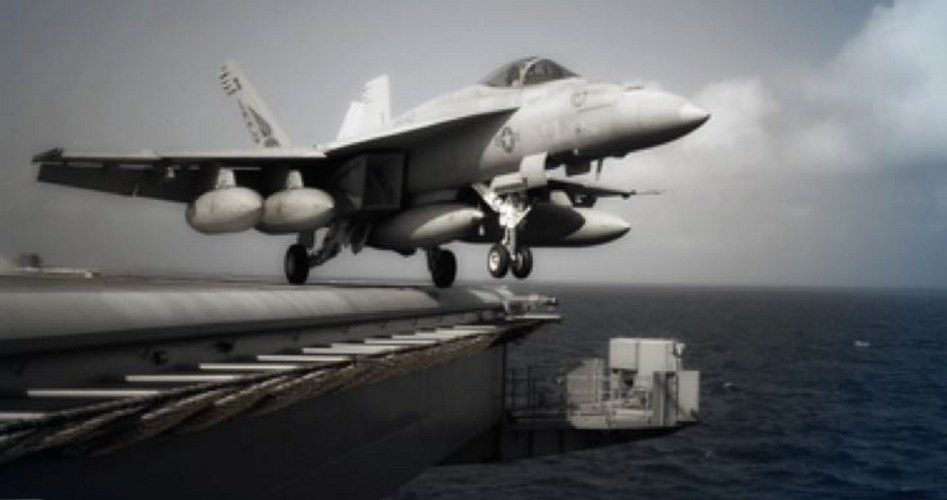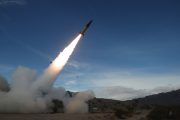
Marine Corps General and Chairman of the Joint Chiefs of Staff Joe Dunford said on August 13 that while the military will make sure President Trump has every military option available to deal with North Korea, the military leadership is supportive of Secretary of State Rex Tillerson’s ongoing efforts to resolve differences with Pyongyang diplomatically. “As a military leader, I have to make sure that the president does have viable military options in the event that the diplomatic and economic pressurization campaign fails,” Dunford said.
“Even as we develop those options, we are mindful of the consequences of executing those options, and that makes us have more of a sense of urgency to make sure that we’re doing everything we absolutely can to support Secretary Tillerson’s current path,” the general continued.
Dunford’s remarks came after he arrived at Osan Air Base, a U.S. Air Fore base built in South Korea in 1952.
The Wall Street Journal noted in a report that the fact that Dunford and his wife, Ellyn, are traveling in the region this week reinforces the view that there is no imminent threat of war, despite the strong words exchanged last week between Trump and North Korean dictator Kim Jong-un.
The day after his arrival, Dunford met with South Korean President Moon Jae-in in Seoul. “The military dimension today is directly in support of [a] diplomatic and economic effort,” Dunford told reporters after meeting with Moon “We are seeking a peaceful resolution to the crisis right now and that’s an important message.”
“It would be a horrible thing were a war to be conducted here on the peninsula, and that’s why we’re so focused on coming up with a peaceful way ahead,” said Dunford, whose father fought in the 1950-53 Korean War.
Even as he expressed his preference for a diplomatic solution, Dunford also sought to reassure the South Koreans that the United States would defend them, should all else fail. The general said it’s important “that the Korean people and the American people know that we are capable of protecting them right now against a limited attack and certainly prepared to respond in the event that deterrence fails.”
As Dunford visited South Korea, two senior Trump administration officials spoke on Sunday talks shows, during which both denied that war with North Korea was imminent. “We’re not closer to war than a week ago, but we are closer to war than we were a decade ago,” the White House’s national security advisor, General H.R. McMaster, said on August 13 on NBC’s Meet the Press.
“The danger is much greater and is growing every day, with every missile test, with the consideration of possibly a sixth nuclear test. And so what we can no longer do is afford to procrastinate,” said McMaster.
Speaking the same day on CBS’s Face the Nation, Central Intelligence Agency Director Mike Pompeo said he didn’t believe an attack from North Korea was “imminent.”
While it’s positive news that our government is placing most of its hopes on a diplomatic, rather than military, solution to the recent escalation in tensions exhibited by the war of words between Trump and Kim, other aspects of Dunford’s visit are nevertheless disturbing.
The Journal reported that Dunford said the purpose of his visit to Seoul was to reassure a critical ally of U.S. support and, as noted above, he said it’s important “that the Korean people and the American people know that we are capable of protecting them right now against a limited attack and certainly prepared to respond in the event that deterrence fails.”
The concept that the United States should protect South Korea or any other country would have been unknown to our Founding Fathers or our early presidents. George Washington, in his farewell address, stated: “The great rule of conduct for us, in regard to foreign nations, is in extending our commercial relations, to have with them as little political connection as possible.… It is our true policy to steer clear of permanent alliances with any portion of the foreign world.”
Thomas Jefferson expressed similar sentiments in his 1801 inaugural address, wherein, citing Washington’s farewell address as his inspiration, he described his preferred foreign policy doctrine as “peace, commerce, and honest friendship with all nations — entangling alliances with none.”
And on July 4, 1821, John Quincy Adams continued the same line of thinking in a speech before the House of Representatives that America “goes not abroad, in search of monsters to destroy. She is the well-wisher to the freedom and independence of all. She is the champion and vindicator only of her own.”
This spirit of noninterventionism has been kept alive by former Representative Ron Paul (R-Texas) who wrote in a column posted by The New American on July 24:
Why is Congress poised to add yet more sanctions on North Korea? Do they want the North Korean people to suffer more than they are already suffering? North Korea’s GDP is half that of Vermont — the US state with the lowest GDP! Does anyone believe they are about to invade us? There is much talk about North Korea’s ballistic missile program, but little talk about 30,000 US troops and weapons on North Korea’s border. For Washington, it’s never a threat if we do it to the other guy.
Here’s an alternative to doing the same thing over and over: Let’s take US troops out of South Korea after 70 years. The new South Korean president has proposed military talks with North Korea to try and reduce tensions. We should get out of the way and let them solve their own problems.
A good suggestion, but we would be very much surprised if Dunford discussed removing U.S. troops from South Korea with President Moon.
Related articles:
China Says It Will Remain Neutral if U.S. Retaliates Against North Korean First Strike
What Does the U.S.-North Korean War of Words Really Mean?
Official Says North Korean Missile Has “.00001 Percent Chance” of Getting Through Defenses
North Korea Tests Ballistic Missile Capable of Reaching U.S. Base on Guam
In Test That Will Send Message to N. Korea, U.S. Successfully Intercepts ICBM
Successful Test of THAAD Anti-missile System Offers Hope for U.S. Defense
South Korea Says North Korean ICBM Lacks Re-entry Capability
Aircraft Carriers Gather Off N. Korea; Pyongyang Tests Missile Able to Hit Ships
Recently Tested North Korean ICBM Said to be in Range of Most of U.S.
N. Korea Continues Missile Tests; U.S. Moves 3rd Carrier Strike Force to Western Pacific



